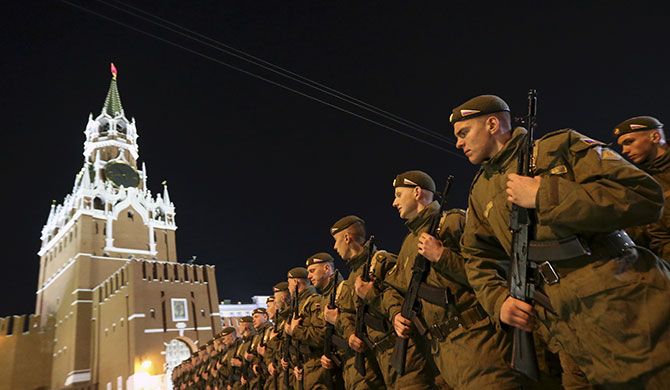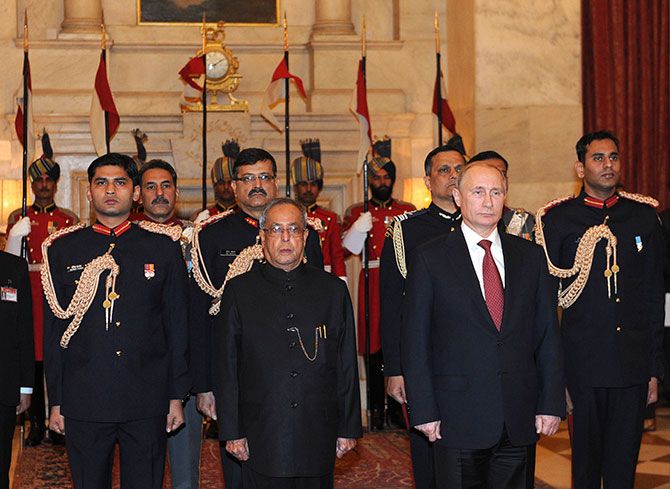'The West owes Russia one hell of a lot for breaking the back of the Nazi war machine so that Europe remained free.'
Yet, the West is 'boycotting' the 70th anniversary of the Victory Day over Nazism, which Russia is celebrating this weekend...'
'There is much symbolism in President Pranab Mukherjee's participation in the Victory Day celebrations in Moscow,' says Ambassador M K Bhadrakumar.

The seventieth anniversary of the victory over Nazi Germany falls this weekend.
World War II erupted when India's freedom struggle was nearing the high noon and the demand was rising to a crescendo that Britain should 'quit' India.
There were two thoughts in the national opinion in India at that time as to who was India's bigger enemy -- Britain or Japan. Unsurprisingly, in zero sum terms, it appeared to many that Britain's defeat meant India's victory.
India, however, ended up fighting Great Britain's battles. The choice of participation or the theatres where Indian blood ought to be shed was made for the Indians by Britain.
India didn't contribute to the eruption of World War II but India nonetheless suffered enormously during the war, as Imperial Britain ransacked the Indian economy pitilessly to mobilise resources for its war efforts and the horrendous scars that it left took decades to heal.
Of course, the Indian national movement as such was ideologically opposed to Nazism and the Congress party, which spearheaded the freedom struggle, took an unequivocal position on the fight against fascism.
Ironically, though, India finally turned out to be an indirect 'beneficiary' of World War II, because Britain emerged out of the war completely exhausted and began sensing by then that holding on to India as a colony was simply beyond its capabilities and resources, which in turn spurred its decision to grant India independence.
Of course, the main theatre of World War II was the Soviet Union. The Western powers adopted a dubious stance when Hitler attacked the Soviet Union and they took their own time to concur with Moscow that fascism was a common enemy and was far more challenging to Europe's modern history than the ideology of socialism.
The Soviet Union was almost bled white in that 'Great Game' played by the West (read Britain), suffering immeasurable losses in human lives and destruction on a scale that mankind has never known.
Ultimately, the Red Army stemmed the tide and began surging toward Berlin and by then the West had also jumped into the fray and had become the Soviet Union's allies.
Without doubt, the West owes Russia one hell of a lot for the huge sacrifices it made and the tremendous sense of fortitude and grit showed by the Russian leadership and the people in breaking the back of the Nazi war machine so that Europe remained free.
Yet, the Western world is 'boycotting' the seventieth anniversary of the Victory Day over Nazism, which Russia is celebrating this weekend. Politics has crept in.
If President Ronald Reagan boycotted the Moscow Olympics (1984) on account of the Soviet intervention in Afghanistan and if President Barack Obama followed suit when the Winter Olympics at Sochi was held in 2014 on account of his (incomprehensible) displeasure over Russia's anti-gay laws, Obama is boycotting the Victory Day celebrations in Moscow this weekend apparently on account of Ukraine.
Of course, when the US boycotts, its allies -- not only the Anglo-Saxon allies but the whole Western bandwagon -- obediently follows suit the lead. Suffice it to say, it is all very highly political -- shenanigans or the petulance of the Western statesmen -- when it comes to Russia and its politics. (By the way, no one boycotted the Los Angeles Olympics (1984) despite the US' ongoing subversion of Nicaragua that began in 1981, its intervention in Lebanon in 1982-1984, its bombing of Grenada in 1983-1984 or its invasion of Honduras in 1983.)

Therefore, there is much symbolism in President Pranab Mukherjee's participation in the Victory Day celebrations in Moscow on May 9. On the face of it, it is abundantly clear that India is expressing solidarity with Russia. It should be noted that Mukherjee is paying a 5-day visit to Russia hosted by Putin.
The decision to attend the Victory celebrations in Moscow can be appreciated from several angles. It is on one plane a 'personal' affair, insofar as Mukherjee has played an indelible role in fostering the relations between India and the Soviet Union.
The Russians know him intimately well and regard him highly as a close friend and trusted statesman.
On the other hand, Russian President Vladimir Putin is also highly regarded in India as a friend who places high importance on his country's strategic understanding with India.
To be sure, Russia is not the Soviet Union, but Putin has inherited the Soviet legacy of friendship with India, which is at once pragmatic and highly strategic and has proved to be mutually beneficial, and is uniquely devoid of contradictions.
No matter the incessant demonising of Putin by the Western media, his esteem in India remains intact -- including the 'Westernists' among the Indian elites who generally take the cue from Washington.
No doubt, Delhi has factored in that the celebrations in Moscow in the weekend bear the personal stamp of Putin.
Having said that, Mukherjee's participation in the weekend celebrations in Moscow is ultimately to be viewed and understood as a foreign policy decision taken by the Narendra Modi government. Such decisions are taken after careful deliberation by the political leadership.
The decision underscores Modi's determination to retain India's 'strategic autonomy' as the anchor sheet of the foreign policies and global strategies. It is by no means to be interpreted as an 'anti-American' gesturing, but it implies nonetheless a vehement rejection of a crucial template of America's world-view in contemporary world politics and all that comes with it, including, arguably, the famous 'pivot to Asia.'
Significantly, Modi himself is heading for China in another week's time on a three-day visit.
Clearly, India is adapting its non-aligned policies to the emergent international situation. Considering that it is the US which is pursuing a containment strategy aimed at isolating and weakening Russia -- and not vice versa -- India's non-alignment works in favour of Russia. That was how it worked all along in the Cold war era, too.
Therefore, those pundits who wrote off India's non-aligned policies as having become 'antediluvian' following Obama's visit to Delhi in January, got their reading completely wrong.
Indeed, Modi himself is due to visit Russia in July to attend the summit meeting of the BRICS countries. There is a strong likelihood of India being formally inducted as a member of the Shanghai Cooperation Organisation, whose summit meeting is also being held in Russia at the same time, in July, during Modi's visit.
Finally, at the end of the year, the annual event of the India-Russia summit will once again see Modi traveling to Russia.
All in all, India is making a highly significant foreign-policy statement regarding its global strategies when Mukherjee arrives in Moscow on Thursday, May 7, and takes the salute on May 9 from the ramparts of the Kremlin when the Indian Army's Grenadiers Regiment will march with the Russian troops down the Red Square.
Its import will not be lost on important world capitals.
REDIFF RECOMMENDS









